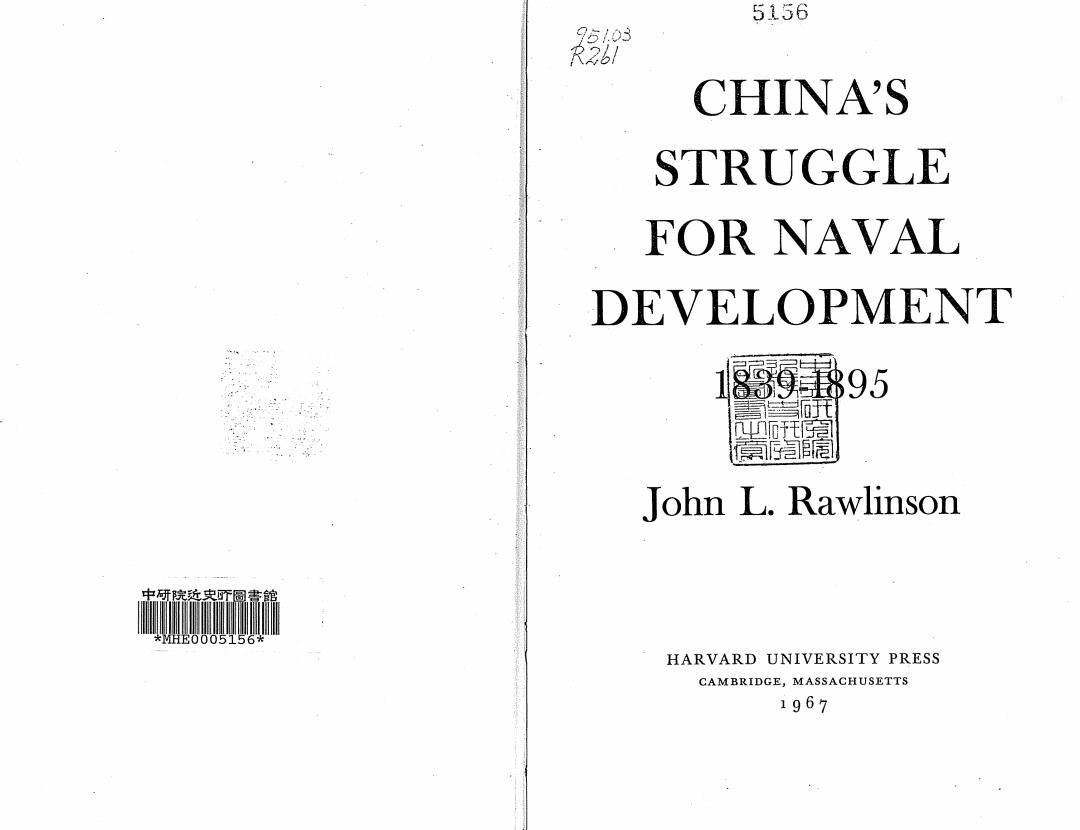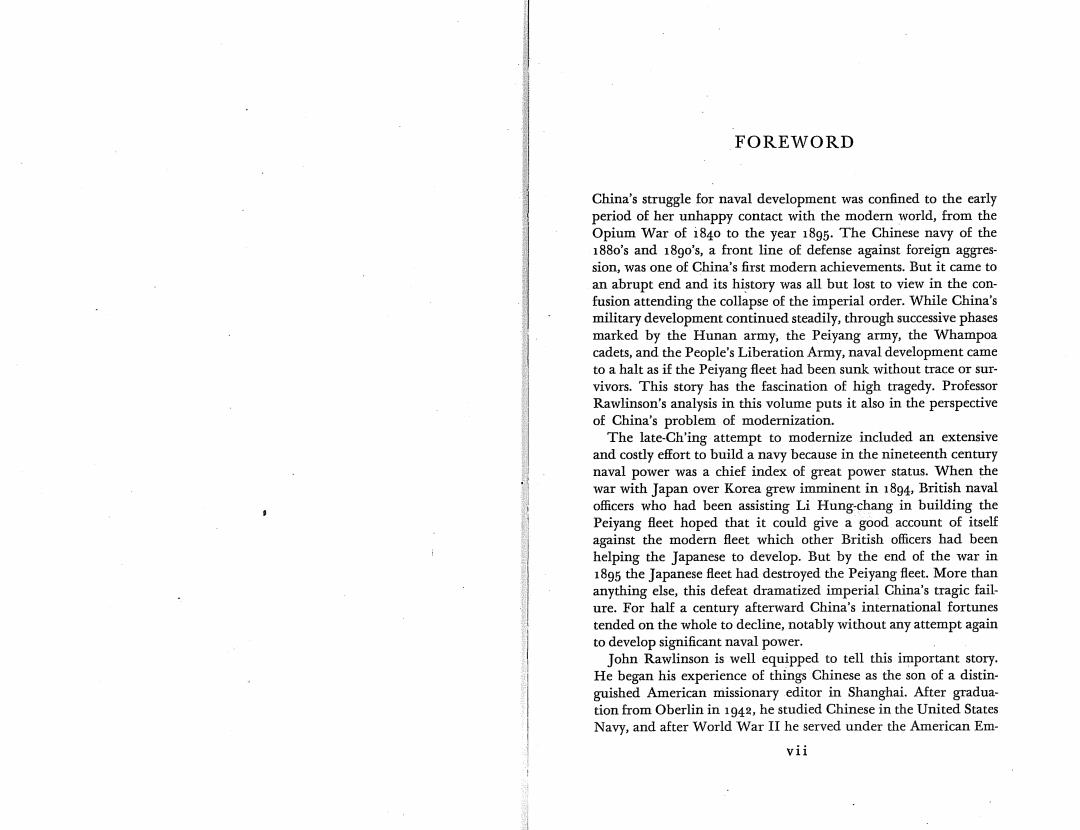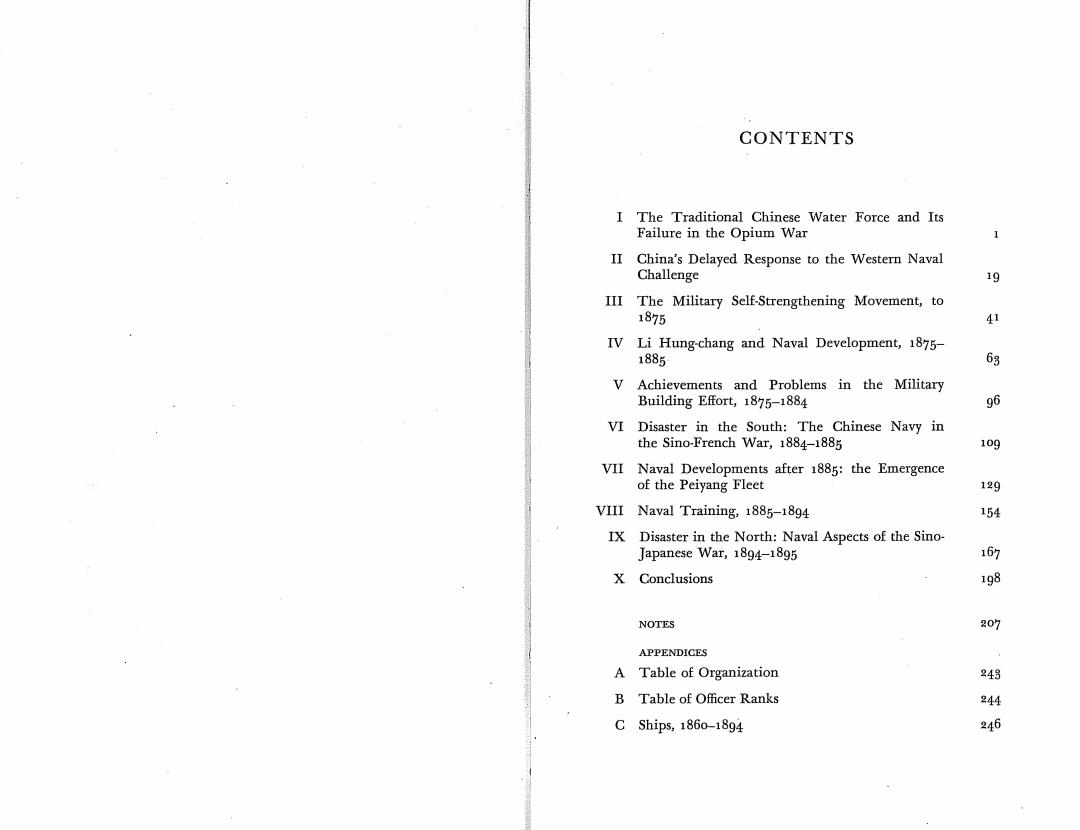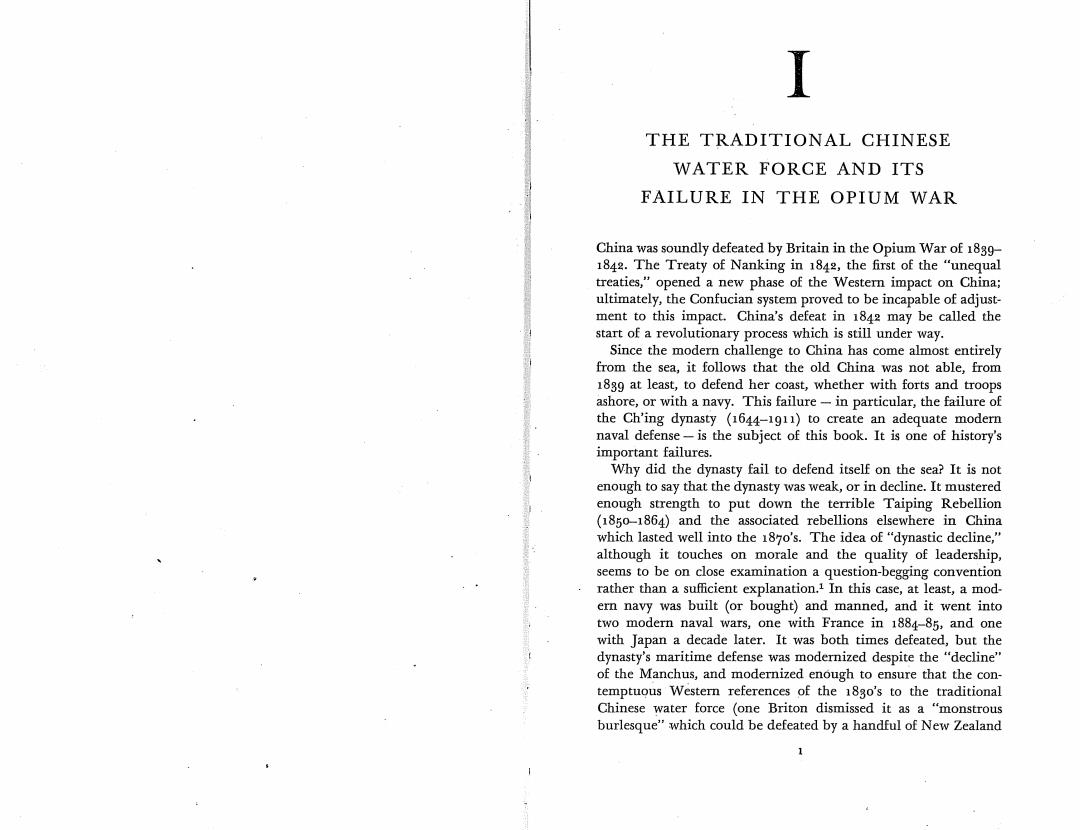
5156 CHINAS STRUGGLE FOR NAVAL DEVELOPMENT 880盡95 John L.Rawlinson HARVARD UNIVERSITY PRESS CAMBRIDGE,MASSACHUSETTS 1967

FOREWORD China's struggle for naval development was confined to the early period of her unhappy contact with the modern world,from the Opium War of i840 to the year 1895.The Chinese navy of the 188o's and 18go's,a front line of defense against foreign aggres- sion,was one of China's first modern achievements.But it came to an abrupt end and its history was all but lost to view in the con- fusion attending the collapse of the imperial order.While China's military development continued steadily,through successive phases marked by the Hunan army,the Peiyang army,the Whampoa cadets,and the People's Liberation Army,naval development came to a halt as if the Peiyang fleet had been sunk without trace or sur- vivors.This story has the fascination of high tragedy.Professor Rawlinson's analysis in this volume puts it also in the perspective of China's problem of modernization. The late-Ch'ing attempt to modernize included an extensive and costly effort to build a navy because in the nineteenth century naval power was a chief index of great power status.When the war with Japan over Korea grew imminent in 1894,British naval officers who had been assisting Li Hung-chang in building the Peiyang fleet hoped that it could give a good account of itself against the modern fleet which other British officers had been helping the Japanese to develop.But by the end of the war in 1895 the Japanese fleet had destroyed the Peiyang fleet.More than anything else,this defeat dramatized imperial China's tragic fail- ure.For half a century afterward China's international fortunes tended on the whole to decline,notably without any attempt again to develop significant naval power. John Rawlinson is well equipped to tell this important story. He began his experience of things Chinese as the son of a distin- guished American missionary editor in Shanghai.After gradua- tion from Oberlin in 1942,he studied Chinese in the United States Navy,and after World War II he served under the American Em- vii

CHINA'S STRUGGLE FOR NAVAL DEVELOPMENT bassy in China,becoming vice-consul at Tientsin.He then took his M.A.and Ph.D.at Harvard and is now associate professor of history and chairman of the Asian Studies Program at Hofstra University,Hempstead,Long Island. ACKNOWLEDGMENTS East Asian Research Center Harvard University In gathering the information for this book,I have tried insofar as possible to do my own translating from Chinese sources,but so great was the bulk of material that I have had to rely on expert assistance.In this connection,I deeply appreciate the careful work done by Immanuel C.Y.Hsui,Wai-kam Ho,Kwang-chih Chang, and John B.Liu.Mr.Te-kong Tong also made helpful sugges- tions.I am especially indebted to my friend Hsin-pao Chang, whose untimely death is a loss not only to me but to the commun- ity of scholars. At the East Asian Research Center,Kwang-Ching Liu,Eliza- beth M.Matheson,and Olive Holmes have made most valuable suggestions,Mrs.Matheson in particular helping me to overcome many stylistic grotesqueries.Over many years I have been indebted to John K.Fairbank,scholar,mentor,gentle but persistent critic, and friend. My departmental chairman,Dr.Gerrit P.Judd,painstakingly read the manuscript and excised many cumbersome passages to the profit of the reader. Thanks for further helpful suggestions made by Francelia Mason of Harvard University Press are also most appropriate,and they should include the work of Marjorie Lawlor,who typed the manuscript. Permission from Constable and Company Limited,London,to quote material from Pulling Strings in China by W.F.Tyler (1929)is gratefully acknowledged. Since this volume is dedicated to my wife,I need not reiterate here the great importance of her contribution. June 1,1966 J.L.R. Hofstra University viii ix

CONTENTS I The Traditional Chinese Water Force and Its Failure in the Opium War II China's Delayed Response to the Western Naval Challenge 和 III The Military Self-Strengthening Movement,to 1875 4 IV Li Hung-chang and Naval Development,1875- 1885 63 V Achievements and Problems in the Military Building Effort,1875-1884 96 VI Disaster in the South:The Chinese Navy in the Sino-French War,1884-1885 109 VII Naval Developments after 1885:the Emergence of the Peiyang Fleet 129 VIII Naval Training,1885-1894 154 IX Disaster in the North:Naval Aspects of the Sino- Japanese War,1894-1895 167 X Conclusions 198 NOTES 207 APPENDICES A Table of Organization 243 B Table of Officer Ranks 244 C Ships,1860-1894 246

THE TRADITIONAL CHINESE WATER FORCE AND ITS FAILURE IN THE OPIUM WAR China was soundly defeated by Britain in the Opium War of 1839- 1842.The Treaty of Nanking in 1842,the first of the "unequal treaties,"opened a new phase of the Western impact on China; ultimately,the Confucian system proved to be incapable of adjust- ment to this impact.China's defeat in 1842 may be called the start of a revolutionary process which is still under way. Since the modern challenge to China has come almost entirely from the sea,it follows that the old China was not able,from 1839 at least,to defend her coast,whether with forts and troops ashore,or with a navy.This failure-in particular,the failure of the Ch'ing dynasty (1644-1911)to create an adequate modern naval defense-is the subject of this book.It is one of history's important failures. Why did the dynasty fail to defend itself on the sea?It is not enough to say that the dynasty was weak,or in decline.It mustered enough strength to put down the terrible Taiping Rebellion (1850-1864)and the associated rebellions elsewhere in China which lasted well into the 187o's.The idea of"dynastic decline," although it touches on morale and the quality of leadership, seems to be on close examination a question-begging convention rather than a sufficient explanation.In this case,at least,a mod- ern navy was built (or bought)and manned,and it went into two modern naval wars,one with France in 1884-85,and one with Japan a decade later.It was both times defeated,but the dynasty's maritime defense was modernized despite the "decline" of the Manchus,and modernized enough to ensure that the con- temptuous Western references of the 18go's to the traditional Chinese water force (one Briton dismissed it as a "monstrous burlesque"which could be defeated by a handful of New Zealand 1